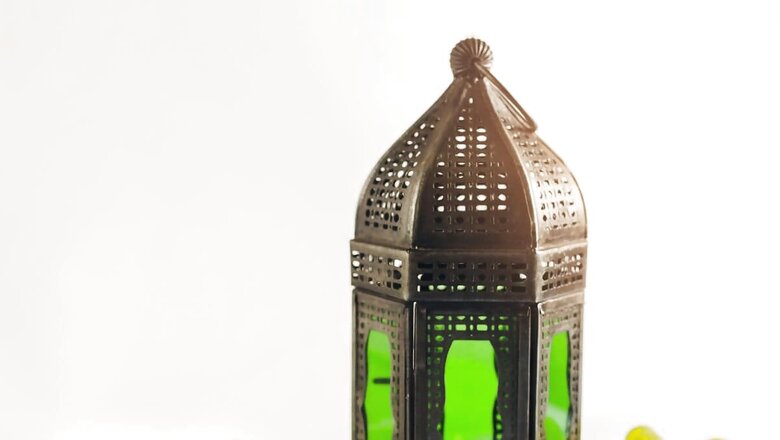
views
With the upcoming holy month of Ramadan, many individuals and families are gearing up with excitement. The festival’s essence lies in strengthening one’s spiritual beliefs and purifying the body by refraining from food and drink from dawn till sunset. However, for those who are unprepared, it may turn out to be exhausting. This year, Ramadan coincides with the scorching hot season in India, and it is crucial to maintain good health and hydration to prepare the body for the month-long fast.
Chef Mrigank Singh, Executive Chef, The Pink Elephant, reminisces his days spent at Lucknow, “Staying hydrated during the day while fasting, depends on what we eat at Sehri. Growing up in Lucknow and spending some time in a hostel in Azamgarh, I was surrounded by friends and neighbours who fasted during Ramadan.”
Now in Hyderabad, he finds the mohabbat ka sharbat to be a fantastic drink to start or end the fast. “The recipe includes watermelon, rose, and milk and is consumed chilled, nothing can be better than that if we add a few basil seeds to it too,” he adds.
Arushi Verma, co-founder, FITPASS shares some tips to make Ramadan fasting easier.
Opt for cold showers
Cold Showers are often considered the fastest way to cool down your elevated body temperature or the feeling of dizziness that is observed due to lack of fluids in the body. During the month of Ramadan, taking a cold shower might help you rehydrate and maintain your body temperature levels. More evident indications such as chapped lips, flushed cheeks, weariness, elevated body temperature, rapid respiration, and difficulty breathing are due to dehydration. If you experience any of these signs, the easiest way to rehydrate without drinking water is to put the back of your head under a direct stream of cool water for five to ten minutes.
Getting sufficient sleep
Sleep is the foundation of the body’s general well-being. Provide your body adequate time to relax and rest since it has multiple benefits ranging from providing you energy to go through the day to enhancing productivity. As a result, obtaining enough sleep is one of the most critical parts of staying healthy when fasting. People who have to maintain their work life along with their fasting schedule are recommended to get enough sleep for about 6-7 hours so that you don’t feel sluggish throughout the day. Inadequate hydration can bring your energy levels down; a proper sleep schedule can offer your body a healthy balance of vitality.
Consume enough water/juices
Staying hydrated in this scorching heat and following a divine ritual for a month long can take a toll on your health sometimes. However, there are enough ways one can manage the hydration level of their body. Make sure you hydrate yourself enough post your iftar to keep your body ready for the next day’s fasting schedule. Include enough citrus fruits in your meals so that you stay hydrated even when consuming water seems burdensome. Another, simpler way to follow this is to add lemon in your water.
Our FITPASS app advises drinking water at regular intervals and helps set a timer for the same. It also calculates the water level present in your body which will help you to further chart your diet plans. Simultaneously, you can also include juices in your daily liquid intake as it will not only help in hydration but also help maintain your blood sugar levels.
Include a banana in your diet to prevent dehydration
One is advised to add roughage to their diets, and an easy way to do so is by eating bananas. In addition to being abundant in essential nutrients like fiber, vitamin C, and a number of antioxidants that can prevent you from feeling exhausted, bananas are also low in calories. They also help maintain your blood sugar levels, and keep your digestive health intact. With the plethora of nutritional benefits, consuming bananas in the morning works as an overall blessing that can make you feel fuller for the rest of your day.
A light workout
Doing exercise can surely lead to dehydration as you lose a lot of fluids through sweat. However, one can definitely opt for light fitness routines like yoga, meditation, low-impact cardio, long walks and so on. Choose a good time to fit your routine in the day (two to three hours after iftar is recommended) and make an effort to drink sufficient amounts of water before bed. Working out has become simpler with AI-based technologies that allow you to work out from the comfort of your own home. Everyone now gets an opportunity to prioritize their physical health and fitness thanks to advances in technology.
What To Eat Before starting your fast
“High fiber food like oats, broken wheat (daliya) in the form of smoothies, and overnight mueslis are great to eat before starting your fast as these grains take time to break down hence providing energy throughout the day. A salad consisting of water rich raw vegetables and fruits will be another great alternative which would also not contain too much salt or sugar which again dehydrates you,” opines Chef Singh.
Payas and Niharis which are eaten in the morning provide a lot of collagen which takes you through the day by providing great energy and being water base soups keep you hydrated too.
Read all the Latest Lifestyle News here


















Comments
0 comment